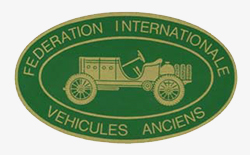 Coming across organisations that lobby and work within the EU legislative procedures, but do so with professionalism, is certainly a breath of fresh air.
Coming across organisations that lobby and work within the EU legislative procedures, but do so with professionalism, is certainly a breath of fresh air.
In their latest newsletter, the Fédération Internationale des Véhicules Anciens (FIVA) reports that it has communicated its position on Vehicle Registration to key MEPs concerning a European Commission proposal for a new vehicle registration Regulation.
This proposed regulation is designed to reduce the administrative burden caused by the need to re‐register a vehicle if it/or the owner moves to another Member State.
However FIVA has concerns and offered solutions to the European Commission, the Rapporteurs in the Lead and Opinion Committees.
These are the Internal Market and Consumer Affairs Committee (IMCO), the Transport Committee and their respective Chairs, UK MEPs Malcolm Harbour and Brian Simpson, who both attend the EP Historic Vehicle Group meetings.
FIVA has also communicated with Bernd Lange, the Chair of the EP Historic Vehicle Group.
Amongst FIVA’s concerns are that some vehicles in the context of “older” vehicles, which include motorcycles, have no registration papers and that some of these vehicles are on occasion sold within the EU.
These older vehicles if they are issued with new registration documents or because they are classified as “new” may not be able to meet the safety and environmental conditions applied to modern vehicles.
FIVAs solution is to call for :
- the Regulation to provide a steer to Member State authorities to help to ensure a consistent, efficient and effective approach to this matter; and suggests that:
- that the Regulation adopt a provision previously included in Commission Regulation No 183/2011 of 22 February 2011 amending Annexes IV and VI to Directive 2007/46/EC, Annex in Appendix 2 , Point 0 which states that: “In the absence of a registration document, the competent authority may refer to available documented evidence of date of manufacture or documented evidence of first purchase.”
At Right To Ride we say, “Fantastic sensible, straight forward lobbying and with a position to achieve a positive outcome, which most importantly offers solutions to an issue that concerns users.”
Leave comments to this article on Right To Ride EU – Click Here
Opportunities For Dialogue – FIVA communicates its position on Vehicle Registration to key MEPs
From EU Legislation Update – May‐June 2012
In April the European Commission proposed a new vehicle registration Regulation designed to reduce the administrative burden caused by the need to re‐register a vehicle if it/or the owner moves to another Member State (please see last EU issue update for information).
The proposal has now been sent to the European Parliament for its scrutiny and FIVA has communicated its position on the proposed Regulation to the Rapporteurs in the Lead and Opinion Committees, respectively Toine Manders (a Dutch Liberal) in the Internal Market and Consumer Affairs Committee and Hubert Pirker (an Austrian Christian Democratic) in the Transport Committee. FIVA has also shared its position with the chair of both Committees Malcolm Harbour and Brian Simpson, both of whom attend the EP Historic Vehicle Group meetings and also with Bernd Lange the Chair of the EP Historic Vehicle Group.
FIVA’s position:
- notes that some vehicles have no registration papers and that that some of these vehicles are on occasion sold within the EU;
- calls for the Regulation to acknowledge that in some Member States a system is in place to allow a vehicle without registration papers to be processed with relative ease – whereas in other cases, authorities are unwilling to seek resolution leading to vehicles not being able to be used either because they are not provided with new registration documents or because they are classified as “new” and hence are unable to meet the safety and environmental conditions applied to modern vehicles; hence FIVA:
- calls for the Regulation to provide a steer to Member State authorities to help to ensure a consistent, efficient and effective approach to this matter; and suggests that:
- the Regulation adopt a provision previously included in Commission Regulation No 183/2011 of 22 February 2011 amending Annexes IV and VI to Directive 2007/46/EC, Annex in Appendix 2 , Point 0 which states that: “In the absence of a registration document, the competent authority may refer to available documented evidence of date of manufacture or documented evidence of first purchase.”
The European Parliament is expected to address the Regulation after the summer recess.
Original Source – Fédération Internationale des Véhicules Anciens (FIVA) – www.fiva.org
Registration of new vehicles
From EU Legislation Update – December 2009-January 2010
The European Commission is currently drafting a Regulation for Individual Vehicle Type Approval. FIVA noted the draft Regulation states that:
For the purposes of individual approval, a vehicle is deemed to be new when:
a) it has never been registered previously or
b) it has been registered for less than six months at the time of the application for individual approval.
By registration, it is meant that the vehicle has obtained the administrative authorisation for entry into service in road traffic, involving its identification and the issuing of a registration number. The term registration includes permanent, temporary and short-term registration as well.
FIVA has noted that this type of definition of new vehicles based on registration documentation is increasingly being used at national level as well and that it is causing problems for historic vehicle owners as the registration documents of a small proportion of historic vehicles do not accurately reflect their age because: there was no original registration; or because documents have been lost; or because original documents was destroyed after import into the EU. In these cases, the vehicle may then be classified as “new” and therefore fail to benefit from other legal provisions/conditions specific to historic vehicles.
FIVA has raised this concern with the European Commission which in the first instance has appeared ready to find a solution. It invited FIVA to propose a footnote which may be used in the Regulation to clarify that the age of a historic vehicle with “new” registration documentation (which does not reflect the vehicles true age) should be determined by the available documented evidence of date of manufacture of the vehicle, or documented evidence of first purchase, or of the year that typically corresponds to that vehicle. FIVA taken the matter forward and will maintain discussions with the Commission with a view to a positive outcome.
Original Source – Fédération Internationale des Véhicules Anciens (FIVA) – www.fiva.org
“Fédération Internationale des Véhicules Anciens” (FIVA)
The “Fédération Internationale des Véhicules Anciens” (FIVA) was founded in 1966 in response to an idea formulated by a handful of organisations representing the interests of historic vehicle enthusiasts within a number of different countries. The founders felt that the time had come for an international body to promote and guide the interests of the historic vehicle movement throughout the world. At present FIVA can boast over 85 member organisations in more than 62 countries throughout the world, which in turn represent more than 1.500.000 historic vehicle enthusiasts.
FIVA’s primary objective is to encourage the safe use of self-propelled, mechanical vehicles, more than thirty years old, on the roads for the benefit of both their owners, dedicated enthusiasts and the general public. To that end FIVA, through its Events’ Commission, has devised its own code for the safe promotion of rallies or mildly competitive events, and in concert with the European Commission, has recently published a Drivers’ Code for more general guidance of historic vehicle users, which can be downloaded here.
FIVA is also concerned with the preservation of historic vehicles, which are accepted as being an important part of our industrial heritage and attempts to catalogue as many historic vehicles as is possible through the FIVA Vehicle ID card, which is administered by its Technical Commission. To further this end it has forged links with UNESCO and has persuaded the European Commission to accept that historic vehicles represent a significant contribution to our industrial heritage. It also has important links with ‘Fédération Internationale de l’Automobile’ (FIA) to promote the interests of historic cars in more sporting arenas and ‘Fédération Internationale Motorcyliste’ FIM to help achieve similar objectives for motorcycles.
The Motorcycle Commission deals with motorcycles, mopeds and tricycles as well as bikes. This commission is a group of friends, who have an enthusiasm to restore, keep and drive these historic vehicles. The commission is also busy with contacts between FIVA and FIM, the world organization of motorcycle clubs and world authority for motorcycle sport activities.
Original Source – Fédération Internationale des Véhicules Anciens (FIVA) – www.fiva.org



Speak Your Mind